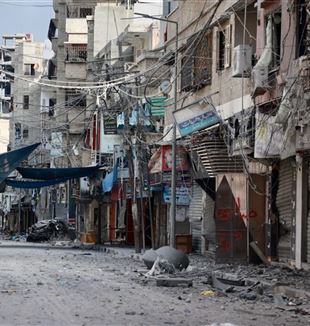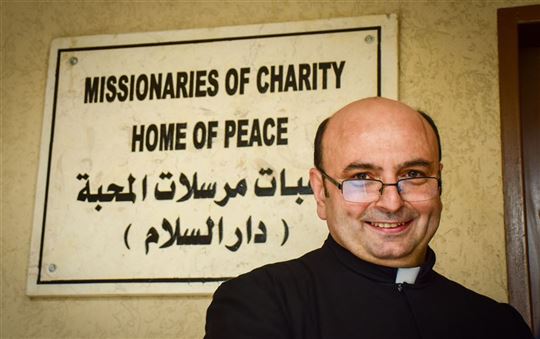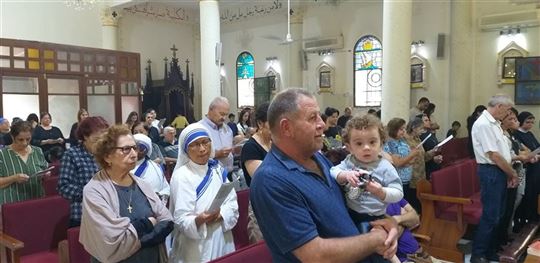
That unassailable “grace”
What are the Christians of Gaza experiencing? In Traces, Fr. Gabriel Romanelli, the parish priest of the one Catholic church in Gaza, speaks about their lives today, from their hospitality to the displaced to the daily companionship of the Pope.In the bare Holy Family Church in Gaza, the one Catholic parish in the whole of the Gaza Strip, children’s voices alternate with the scream of missiles. Every morning they are on their knees, raising their prayers to Jesus, with the total trust unique to little ones, says their parish priest, Fr. Gabriel Romanelli. And the adults look at them–these are their parents, who want to make them feel safe but are powerless to do so, the catechists, the nuns, the vicar Fr. Youssef Asaad, the over seven hundred displaced people hosted within those walls, and the pope.
“Every day since the beginning of this war, the Holy Father has joined us on a video call to pray together and give us his blessing. We have no strength other than the celebration of daily Mass: our certainty lies there because for us faith is a certainty, not an emotion. For us, faith is the certainty that if God is permitting this, it is for a greater good, one we do not see immediately because our eyes are blurred with tears. At times perhaps we cannot perceive right away what the Holy Spirit is whispering to us because the explosions of the bombs and the screams seem louder. But in online or telephone conversations with my people, I can assure you that hatred never emerges. Even the children know these truths: they are afraid, yes, but they know Who to entrust that fear to. Our concrete hope is in Christ who was born, who chose us to be friends, and who died for us.” Fr. Gabriel speaks with a tired but constant smile during this interview, which should have lasted a few minutes but by grace was extended to over an hour, by the patience of a priest who has nothing to offer “but every moment the Good Lord grants me to live.” He is speaking from Jerusalem, because he has not been allowed to return to Gaza, but is in constant contact with his people. 
He recounts that a year ago, at Christmas, a census of Christians in the Gaza Strip revealed “there were 1,017 of us. After the explosion of the conflict, 999 remained. We have all lost someone we know. In a mysterious way, we have all been asked to stay in front of pain and death, in front of the questions that inevitably arise at the suffering of the innocent, those who are not to blame.” He is speaking of the children who attend the schools run by the Latin Patriarchate of Jerusalem, the couples he joined in marriage and whom he has watched over the years as they formed families, the elderly and the many disabled people (including a substantial number of children) cared for and followed by the Sisters of Mother Teresa. “Disability is not a secondary problem,” he explains, “because if you are confined to a territory from which it is very difficult to enter or leave, often there are marriages between people who are related, with easily imaginable consequences.”
The Latin parish is small, 135 Catholics in all, but very united and active. Their presence is made concrete in the territory through three Catholic schools open to anyone, ten parish groups, and numerous activities at the service of the entire population of Gaza, from healthcare assistance for the elderly and disabled to distribution of food and basic necessities to the care of so-called “butterfly children,” affected by epidermolysis bullosa, a rare genetic disease that provokes serious lesions of the skin. Because of this charitable work, the Christian community, though an invisible minority, is esteemed by everyone.
Fr. Gabriel, too, is well known in the Holy Land, where he served first as a teacher at the Patriarchate Seminary, and then as a parish priest in Gaza, together with his friend Fr. Youssef and two sisters of the Servants of the Lord of the Virgin of Matarà. “They are twins from Peru, consecrated thirty years ago and for the first time serving together in the same mission.”
His call to the priesthood came early, when he was twelve years old. “I was living in Buenos Aires. In our parish and in our family, we prayed daily for the people suffering under the oppression of the Soviet Union. We did the Way of the Cross every Friday, and each station was offered for a nation or group of nations where Christians were persecuted. This child hood experience kindled my desire to be a missionary. When I was eighteen, I entered the seminary of the Congregation of the Incarnate Word in San Rafael. After some time, I offered to serve in a country of the former Soviet Union or in China, but my superiors proposed Palestine to me, the land of Jesus. I was surprised, thinking it was a destination for more expert priests: after all, I was only twenty-five years old. But my superior had called then patriarch Michel Sabbah to tell him that our order had no material help to offer, but having received by the goodness of God the gift of some new vocations, could offer those people in the service of what John Paul II had called ‘the Mother Church of Jerusalem.’”
Twenty-eight years later, the priest is still there. He has seen tensions ignite in alternating phases, has known the wrongs and rights of all the parties involved, but above all, has observed the flowering of the Christian presence in the Holy Land, even now: “It seems like a contradiction, I know. For many of us, the violence in these weeks has taken our loved ones, our homes and businesses. The bombings have not even spared the churches, including the parish facilities which hosted hundreds of displaced people close to the historic Church of Saint Porphyr. The people wander the streets in fear; there are no bomb shelters here and often there is no electricity or water. But hatred has not cut into the hearts of my parishioners. It did not happen before and it is not happening now. This is why the Christian presence is so precious. They affirm a logic, that of the cross, which is the one thing capable of giving hope. The cross must be embraced, however it comes to us.”
What does this mean? How is it possible to embrace the cold body of your murdered son and forgive? The questions arise insistently, with irritation. His answer is placid. “The pain is enormous, and we are called to go through it and live it. Sooner or later it is asked of everyone, in every circumstance. Jesus, too, was alone in Gethsemane. He, too, was afraid and wept and felt alone. But in His Passion, He offered everything for the good of the world. ‘Not my will, but Yours.’ This is the revolution! Our ways of thinking do not save us. In order to make our faith grow, so that we can endure even when everything seems dark, God offered us a friendship. He was born to share with us. He ate with fishermen, walked with the poor, and spoke with the children. He offered companionship and this brought goodness. Two thousand years later, using the identical method, we can know Him and recognize when He is calling us to love, to forgive, and to serve. It is not difficult to imagine how easily we could experience hatred here, or the rejection of certain people. Instead, something miraculous happens: we do not give space to hatred, but to God. We, who live in communion with Him, have an hour of adoration every day; we go to confession and celebrate Mass, and this gives us strength so we can continue to be at the service of all, be they Muslim, Druze, Jewish.… When we welcome someone, we know we are welcoming Jesus in His mysterious presence. Today we are hosting over seven hundred displaced people, and it is no different: it is Jesus, who never fails to come be with us.”
Forgiveness, he continues, is something revolutionary, the fruit of a deeply rooted faith. “If our faith were only pure emotion, we could not forgive or hope today; we would fall prey to desperation. The pain is so great, but I have never heard one of my parishioners curse God. Never. A few days ago, an Orthodox Christian teacher at one of our schools wrote a striking letter. Her mother and father were killed in a bombing and she was injured; now she is being cared for by us in the parish. At the end of her letter, she asked God to be her light, to help her not give way to anger. She closed by saying, ‘Give me Your mercy. And thanks.’ She thanked God. This does not mean being a people that is resigned or crazy. We ask for concrete solutions, like the opening of humanitarian channels and the end of the war. We continue to support, together with the pope, the solution of ‘two peoples, two nations,’ and a special status for Jerusalem, even though we know at the moment it is unlikely that this proposal could be realized. We are suffering because we love so much. The greater the love, the greater the pain. But Calvary isn’t the end. The consolation we experience is stronger because Calvary leads us close to the burial of Christ, draws us closer to His Resurrection. We feel embraced by Christ, and as Cardinal Pizzaballa said, we pray and fast together with you, so that we can return this embrace and never lose it.”